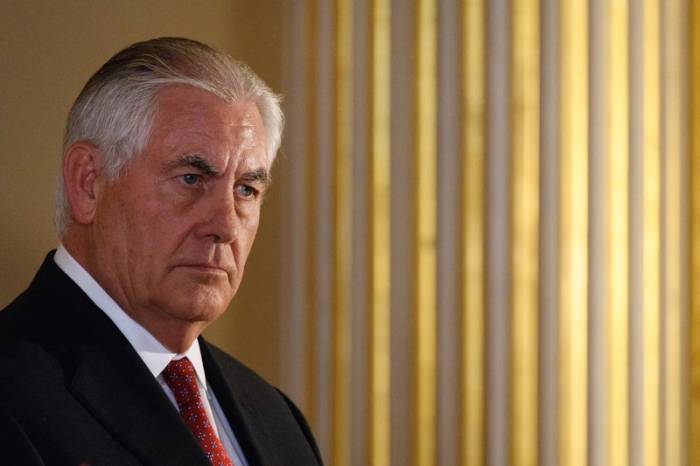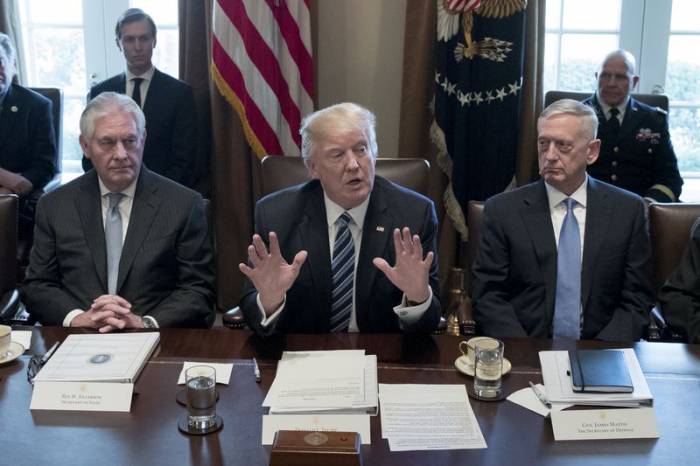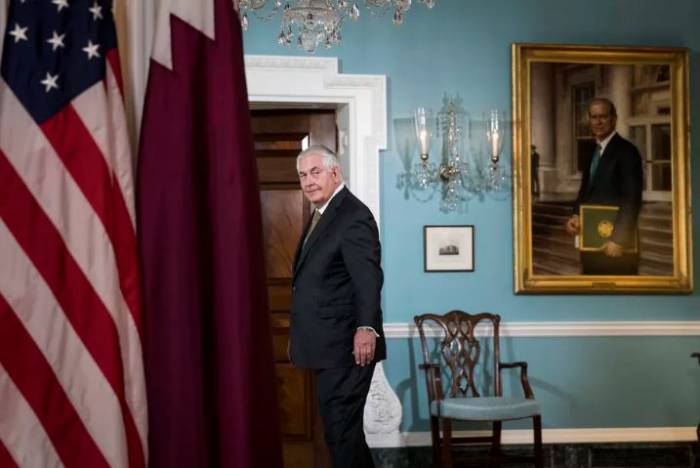Secretary of State Rex Tillerson was fired by President Donald Trump, according to White House officials’ statements on Tuesday morning.
He was in office for a little over a year, one of the shortest tenures in modern history — and it was not, experts say, a distinguished one.
“Tillerson would be at or near the bottom of the list of secretaries of state, not just in the post-Second World War world but in the record of US secretaries of state,” says Paul Musgrave, a scholar of US foreign policy at the University of Massachusetts Amherst.
The former Exxon Mobil CEO, whose nomination was initially greeted warmly by prominent foreign policy hands, will leave office without any major accomplishments. This is largely because he failed to wield any significant influence in internal administration debates over issues like North Korea or Russia, and in fact actively alienated the president during several key policy debates.
His push to slash “inefficiencies” in the State Department and seeming disinterest in working closely with longtime staff were even more damaging. Under Tillerson’s watch, 60 percent of State’s top-ranking career diplomats resigned and new applications to join the foreign service fell by half, according to a November count by the American Foreign Service Association.
This hollowing-out of the foreign service, combined with Tillerson’s inability to appoint people to vital positions like ambassador to South Korea, delayed American responses to major crises and weakened the State Department for a “generation,” according to George Washington University’s Elizabeth Saunders.
This can’t all be blamed on Tillerson: Even a skilled and experienced diplomat would have had trouble maintaining influence in the chaotic Trump White House, a place where foreign policy is often made over Twitter. As if to underscore the point, Trump announced Tillerson’s departure in a tweet — before the secretary himself could make a statement.
Yet scholars and foreign policy practitioners across the political spectrum agree that he deserves much of the blame.
"I think he really will go down as one of the worst secretaries of State we've had," Eliot Cohen, counselor to the State Department under President George W. Bush, told Axios’s Jonathan Swan. “He will go down as the worst Secretary of State in history,” tweeted Ilan Goldenberg, an Obama-era State Department official.
Many expected Tillerson to be one of the “adults in the room,” helping Secretary of Defense James Mattis rein in some of Trump’s wildest ideas. His attempts to play that role backfired — his ham-handed attempts to manage Trump alienated the president, who has reportedly complained about his “totally establishment” views on foreign policy.
When you combine the lack of influence over Trump with Tillerson’s dismantling of the State Department’s staff — he made more of a mess of the department in a shorter amount of time than any other secretary of state in history — you have a truly disastrous tenure in Foggy Bottom.
“He took the job and made it smaller,” Musgrave says.
Tillerson failed at the thing he was supposed to be good at

When Trump announced Tillerson as his pick for secretary of state, back in December 2016, the foreign policy community was split on the appointment.
As CEO of Exxon Mobil, one of the world’s largest corporations, Tillerson seemed to be more than qualified to effectively manage a sprawling bureaucracy like the State Department. Mainstream GOP foreign policy experts like former Defense Secretary Robert Gates, former Secretary of State Condoleezza Rice, and former National Security Adviser Stephen Hadley all praised the pick.
"He would bring to the position vast knowledge, experience, and success in dealing with dozens of governments and leaders in every corner of the world,” Gates said in a statement. "He is a person of great integrity whose only goal in office would be to protect and advance the interests of the United States.”
Critics, though, worried about Tillerson’s close relationship with Vladimir Putin and Exxon’s willingness to strike deals with corrupt foreign dictators and history of lobbying against climate change (though the corporation now says it accepts climate science). During his January confirmation hearings, senators grilled him about both Russia and climate change, with Democrats clearly unsatisfied by his answers.
"Do you lack the knowledge to answer my question, or refuse to answer my question?" Sen. Tim Kaine (D-VA) puffed after Tillerson repeatedly stonewalled his questions about Exxon funding climate change denial. "A little of both,” Tillerson replied.
Tillerson was confirmed in late January 2017 nonetheless, in a vote that basically fell along party lines. Quickly, he set about upending everyone’s views about him. As soon as March, it had become clear that the conventional wisdom was 100 percent wrong. The fears about Tillerson’s policy views had proven overblown, mostly because he had been completely overshadowed in internal White House deliberations over issues like Syria and Russia.
“More than a month after he became America’s top diplomat, Rex Tillerson is like no other modern secretary of State: he’s largely invisible,” the LA Times’s Tracy Wilkinson reported at the time. “His influence at the White House is difficult to discern. He appears to be competing with Jared Kushner, Trump’s son-in-law, and Stephen Bannon, the president’s chief strategist, both of whom have Trump’s ear on foreign policy.”
The optimism about Tillerson’s management acumen, by contrast, had clearly been misplaced. Tillerson failed to place political appointees in a number of vital leadership positions, failed to spend a lot of time with his own employees, and pushed out longtime employees without clear replacements in mind. Morale inside the organization collapsed.
“I used to love my job,” one State Department staffer told the Atlantic’s Julia Ioffe at the time. “Now, it feels like coming to the hospital to take care of a terminally ill family member. You come in every day, you bring flowers, you brush their hair, paint their nails, even though you know there’s no point. But you do it out of love.”
What was true in March remained true for the rest of Tillerson’s brief tenure. On issue after issue, Tillerson proved to be out of touch with the president’s foreign policy positions.
The US bombed Syrian dictator Bashar al-Assad in early April — just days after Tillerson suggested the administration would be fine with Assad staying in power. On June 9, Tillerson called on Saudi Arabia and its allies to end their isolation of Qatar; less than two hours later, Trump sided with the Saudis by labeling Qatar “a funder of terrorism at a very high level.”
On July 20, after a meeting in which the president reportedly asked for a major expansion of America’s nuclear arsenal, Tillerson told aides that the president was a moron — or, according to some reports, a “fucking moron.” One time, Tillerson tried to open the door to negotiations with North Korea — and Trump slapped him down in a tweet.
The staffing problem at the State Department remained bad throughout Tillerson’s tenure and in some ways got even worse. Only 64 out of 153 political appointees were confirmed by the Senate, according to a count by the Washington Post and Partnership for Public Service. He had not nominated anyone to be the assistant secretary supervising vital regions like Asia and the Middle East, nor did he nominate ambassadors for countries as important as Saudi Arabia and South Korea.
These kinds of vacancies can be devastating.
Political appointees are necessary to shape policy, as they serve as a conduit between the administration and foreign governments. Without people in these positions, career diplomats fill in as best as they can, but they have a hard time making new decisions or formulating new policy. It’s near unprecedented to go this long with this many vacancies, because it cripples America’s ability to develop diplomatic stances on vital issues.
“When I was assistant secretary, I was sworn in early April [of the first year],” says Hank Cohen, the assistant secretary of state for Africa under George H.W. Bush. Under Tillerson, this position has still not officially been filled. “It’s a big problem,” Cohen said.
In addition to that, it’s not like the past year has been uneventful. During Tillerson’s tenure, tensions over North Korea’s nuclear program got so bad that war started to seem like a real possibility — and then President Trump decided to sit down with Kim Jong Un for the first direct negotiations ever between Washington and Pyongyang. One US ally in the Gulf (Saudi Arabia) laid economic siege to another (Qatar). Russia apparently poisoned a double agent on British soil.
And even the career staff suffered under Tillerson. He eliminated entire segments of the department, like the department that tracked war crimes. He imposed limits on transfers inside the organization, typically a way the State Department deals with staffing shortages, in late June.
He publicly defended a Trump administration proposal to cut his department’s budget by 30 percent and has repeatedly pushed for staffing cuts despite repeated rebukes from Congress. He also cut off the department from vital recruiting sources, like the Presidential Management Fellows program.
“Secretary Tillerson’s term has led to widespread demoralization in the foreign service, the dismissal or resignation of people with expertise that individually may not be irreplaceable but as a cohort certainly becomes so,” Musgrave says. “That hinders the State Department’s ability to enhance US interests through diplomacy.”
The State Department’s personnel shortfalls have long-term effects on everything ranging from the South China Sea to the Israeli-Palestinian conflict — you can’t negotiate very well if you don’t have people who know how to do it. Saunders analogizes the US under Tillerson’s emaciated State Department to a person who doesn’t have health insurance. “Your life is probably fine — up until the point you get sick,” she says.
The source of Tillerson’s failures is both Trump and his own choices

Why did things go so wrong for Tillerson?
Some of the blame has to be laid at his boss’s feet. Trump is running a chaotic administration that has nominated a shockingly low number of political appointees across practically every department. The White House shot down so many of Tillerson’s picks for top deputies that he actually screamed at a group of White House aides during a meeting.
Trump personally displayed little to no interest in learning from the expertise of State Department personnel, preferring instead to push his pet priorities like weakening the Iran deal and withdrawing from the Paris climate accord.
“It may be that in a Trump administration, the structural realities of the way the White House works, you can only choose among varieties of failure,” Musgrave says.
But that excuse only goes so far. Defense Secretary Mattis hasn’t been immune to Trump’s bizarre management style — he was blindsided, most notably, by Trump’s proposal to ban transgender people from serving in the military — but on the whole, he has been far more effective at advocating for his department’s interests and gaining influence over the president’s decision-making.
You could say this is because Trump has more respect for generals than diplomats, and that’s partially true. Mattis also seems better at handling Trump’s mercurial nature; according to the New York Times, Tillerson frequently annoyed the president in meetings by (among other things) saying, “It’s your deal,” whenever Trump overruled him.
But a third and vital part of it, experts say, is that Mattis — a career military professional and former general — is substantially better at working in Washington. In particular, Mattis understood that working closely with his staff in the Pentagon allowed him to advance policy ideas through the bureaucracy.
“Mattis is drawing on the expertise of his building. Some of that is a product of [his own] experience,” Saunders says. “Tillerson is not a creature of his building, nor is he a creature of government at all.”
By most accounts, Tillerson failed to build relationships with people in Foggy Bottom, relying instead on an insular inner circle made up of a few longtime confidants. This decision “constitutes the core of his failure,” according to Musgrave: It made it hard for Tillerson to garner influence inside the White House and to understand what his staff could do and how to deploy them effectively.
“Tillerson had a half-dozen, maybe a dozen aides who are not familiar with Washington and especially not familiar with the State Department,” Musgrave says. “But he seems to rely on these people who are loyal to him, known to him, at the expense of building relationships with the people in the building.”
Perhaps if Tillerson had developed closer relationships with State’s career staff, he would have understood that supporting budget cuts to his own department and downsizing staff would demoralize them. Perhaps he would have been able to develop new ideas that would have gotten the president’s ear. Perhaps he would have been more able to convince the White House to trust his judgment on political appointees.
Perhaps, perhaps, perhaps. But the truth is we won’t know because Tillerson, to a degree nearly unprecedented in State’s history, failed to even try to work with his own department.
All of which invites the question: Why did this multimillionaire leave his cushy job at the head of one of the world’s largest corporations and then take a job at a government bureaucracy he didn’t understand and seemingly didn’t respect?
It’s a question only Tillerson can answer. And right now, it doesn’t seem like he’s in the mood for a lot of talking.
More about: Rex-Tillerson
















































